Mission Juno
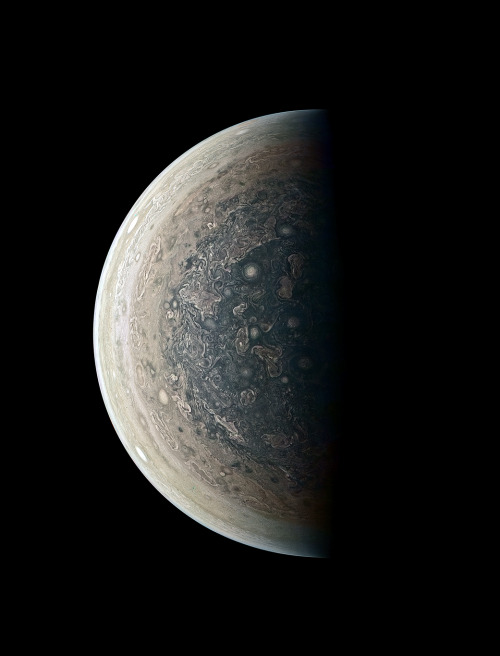
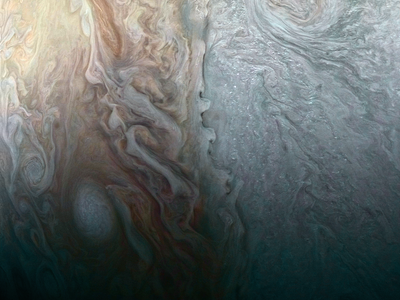



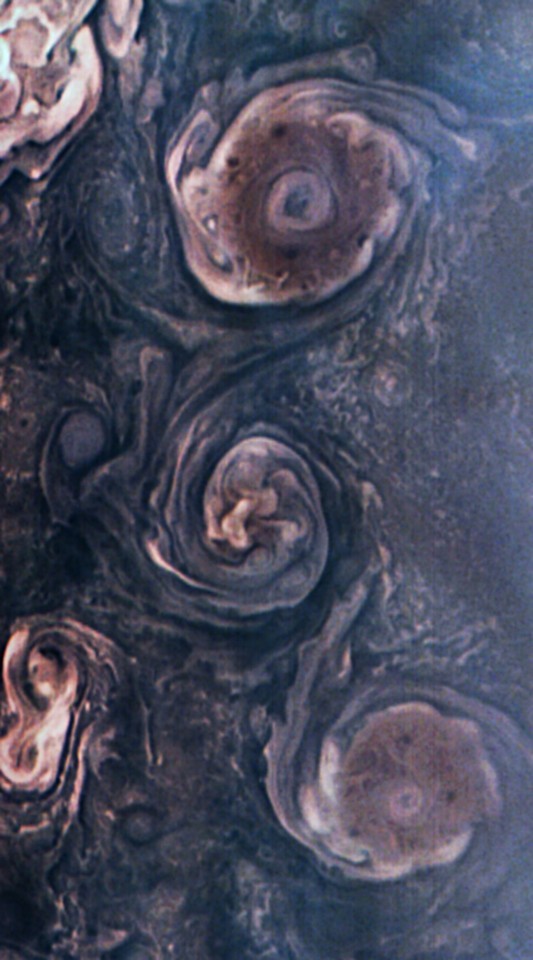



Images of Jupiter taken by JunoCam on NASA’s Juno spacecraft.

Mission Juno
Juno is a NASA spacecraft. It is exploring the planet Jupiter. Juno launched from Earth in 2011. It reached Jupiter in 2016. That was a five-year trip!
The name “Juno” comes from stories told by the Romans long ago. In the stories, Juno was the wife of Jupiter. Jupiter hid behind clouds so no one could see him causing trouble. But Juno could see through the clouds.
Juno has science tools to study Jupiter’s atmosphere. (The atmosphere is the layer of gases around a planet.) Juno will take the first pictures of Jupiter’s poles. The spacecraft will study the lights around Jupiter’s north and south poles, too.
Juno will help scientists understand how Jupiter was made. The spacecraft will help them learn how Jupiter has changed, too. The new discoveries can help us understand more about our solar system.
Sound of Jupiter’s Magnetosphere: Click here
Credit: NASA / JPL-Caltech / Mission Juno / Jason Major / Luca Fornaciari / Gerald Eichstädt
More Posts from Hannahhaifisch and Others

Four Planet System in Orbit, Directly Imaged | Planetary Landscapes Credit: Many Worlds
This evocative movie of four planets more massive than Jupiter orbiting the young star HR 8799 is a composite of sorts, including images taken over seven years at the W.M. Keck observatory in Hawaii.
Read more here.





Fluorite and Baryte
Locality: Berbes, Asturias, Spain




Substances don’t have to be a liquid or a gas to behave like a fluid. Swarms of fire ants display viscoelastic properties, meaning they can act like both a liquid and a solid. Like a spring, a ball of fire ants is elastic, bouncing back after being squished (top image). But the group can also act like a viscous liquid. A ball of ants can flow and diffuse outward (middle image). The ants are excellent at linking with one another, which allows them to survive floods by forming rafts and to escape containers by building towers.
Researchers found the key characteristic is that ants will only maintain links with nearby ants as long as they themselves experience no more than 3 times their own weight in load. In practice, the ants can easily withstand 100 times that load without injury, but that lower threshold describes the transition point between ants as a solid and ants as a fluid. If an ant in a structure is loaded with more force, he’ll let go of his neighbors and start moving around.
When they’re linked, the fire ants are close enough together to be water-repellent. Even if an ant raft gets submerged (bottom image), the space between ants is small enough that water can’t get in and the air around them can’t get out. This coats the submerged ants in their own little bubble, which the ants use to breathe while they float out a flood. For more, check out the video below and the full (fun and readable!) research paper linked in the credits. (Video and image credits: Vox/Georgia Tech; research credit: S. Phonekeo et al., pdf; submitted by Joyce S., Rebecca S., and possibly others)

“X-rays reveal the inner beauty of shells.” National Geographic. March 1955.

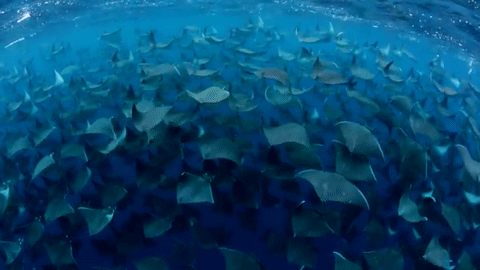
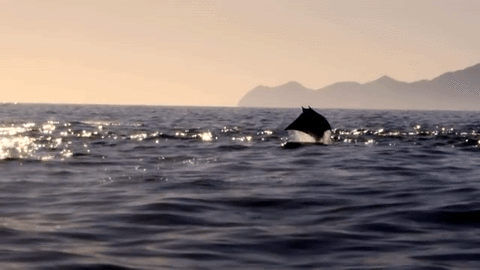
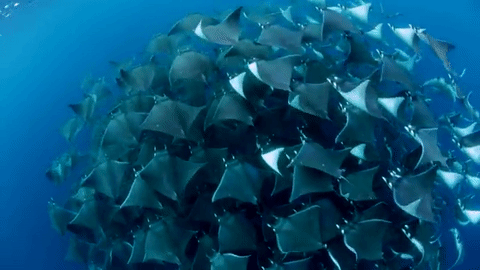

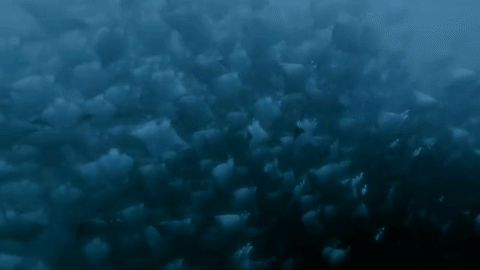
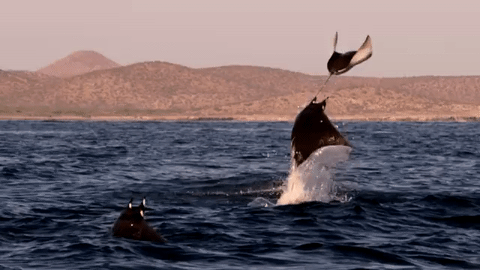
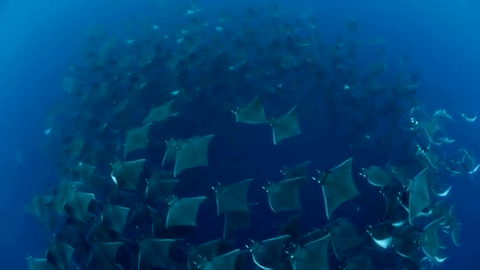
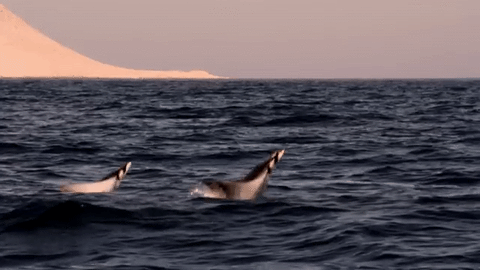
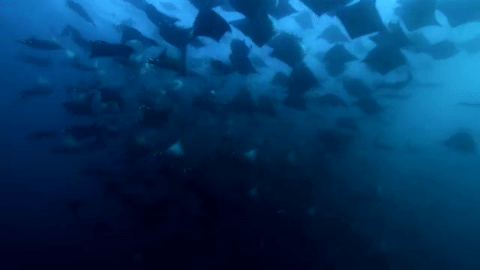
closely related to sharks but with long, flat bodies and wing-like pectoral fins, mobula rays are ideally suited to swooping through the water - here off the gulf of california - yet seem equally at home in the air, so much so that they have earned the name “flying rays”. mobula rays can reach heights of more than two metres, remaining airborne for several seconds.
mobula rays are quite elusive and difficult to study, so biologists are not quite sure why they jump out of the water. theories vary from a means of communication, to a mating ritual (though both males and females jump), or as a way to shed themselves of parasites. they could also be jumping as a way of better corralling their pray, as seen with them swimming in a circular formation.
what is known about mobula rays is that they reach sexual maturity late and their investment in their offspring is more akin to mammals than other fishes, usually producing just a single pup after long pregnancies, all of which makes them extremely vulnerable to commercial fishing, especially as a species that likes to come together in large groups.

Hubble Image Captures Collision of Two Spiral Galaxies
http://www.sci-news.com/astronomy/hubble-collision-two-spiral-galaxies-04839.html
https://player.vimeo.com/video/58293122?title=0&byline=0&portrait=0
Hannah Reber, “Untitled (spin the bottle)”, 2013, installation version #3

Counting the stars in the universe is like trying to count the number of sand grains on a beach, it’s not possible. Although estimates vary among different experts, the general consensus is that there are at least between 100 billion and 200 billion galaxies in our universe. Think about that for a moment, and now throw in billions of stars in each galaxy! (source) This number could very easily be in the trillions for all we know.
A team of scientists gathered data on more than 8000 galaxies that surround the one we live in, also mentioned above, the Milky Way galaxy. They mapped each galaxies movement and position in space and discovered that the Milky Way galaxy is part of one giant system that contains a number of other galaxies, referred to as a supercluster.
-
 buddahman liked this · 3 months ago
buddahman liked this · 3 months ago -
 charliesian reblogged this · 4 months ago
charliesian reblogged this · 4 months ago -
 eveeyehorizons liked this · 5 months ago
eveeyehorizons liked this · 5 months ago -
 shotofstress reblogged this · 7 months ago
shotofstress reblogged this · 7 months ago -
 thatmoirevibration reblogged this · 10 months ago
thatmoirevibration reblogged this · 10 months ago -
 hellonursevenus reblogged this · 10 months ago
hellonursevenus reblogged this · 10 months ago -
 hellonursevenus liked this · 11 months ago
hellonursevenus liked this · 11 months ago -
 varginhamonologues reblogged this · 1 year ago
varginhamonologues reblogged this · 1 year ago -
 vicissitudeislove liked this · 1 year ago
vicissitudeislove liked this · 1 year ago -
 bigbzworld liked this · 1 year ago
bigbzworld liked this · 1 year ago -
 fall-and-shadows liked this · 1 year ago
fall-and-shadows liked this · 1 year ago -
 varginhamonologues liked this · 1 year ago
varginhamonologues liked this · 1 year ago -
 vermilionvexation liked this · 1 year ago
vermilionvexation liked this · 1 year ago -
 a-grief-observed reblogged this · 1 year ago
a-grief-observed reblogged this · 1 year ago -
 deadlysunlight reblogged this · 1 year ago
deadlysunlight reblogged this · 1 year ago -
 diotermotice liked this · 1 year ago
diotermotice liked this · 1 year ago -
 mypixelstories liked this · 1 year ago
mypixelstories liked this · 1 year ago -
 umbra-life reblogged this · 1 year ago
umbra-life reblogged this · 1 year ago -
 buypithetin liked this · 1 year ago
buypithetin liked this · 1 year ago -
 5150juanfer reblogged this · 1 year ago
5150juanfer reblogged this · 1 year ago -
 theshadowline liked this · 1 year ago
theshadowline liked this · 1 year ago -
 aroundtheseparts liked this · 2 years ago
aroundtheseparts liked this · 2 years ago -
 daddyslilhorror reblogged this · 2 years ago
daddyslilhorror reblogged this · 2 years ago -
 2880cjk liked this · 2 years ago
2880cjk liked this · 2 years ago -
 joecare4 liked this · 2 years ago
joecare4 liked this · 2 years ago -
 all11is11one reblogged this · 2 years ago
all11is11one reblogged this · 2 years ago -
 umbra-life reblogged this · 2 years ago
umbra-life reblogged this · 2 years ago